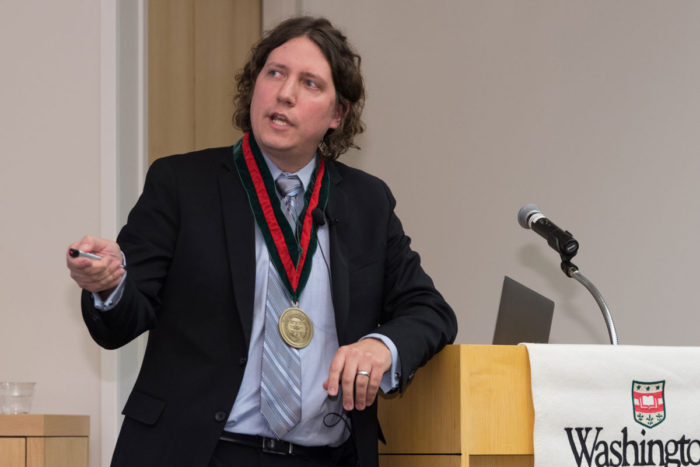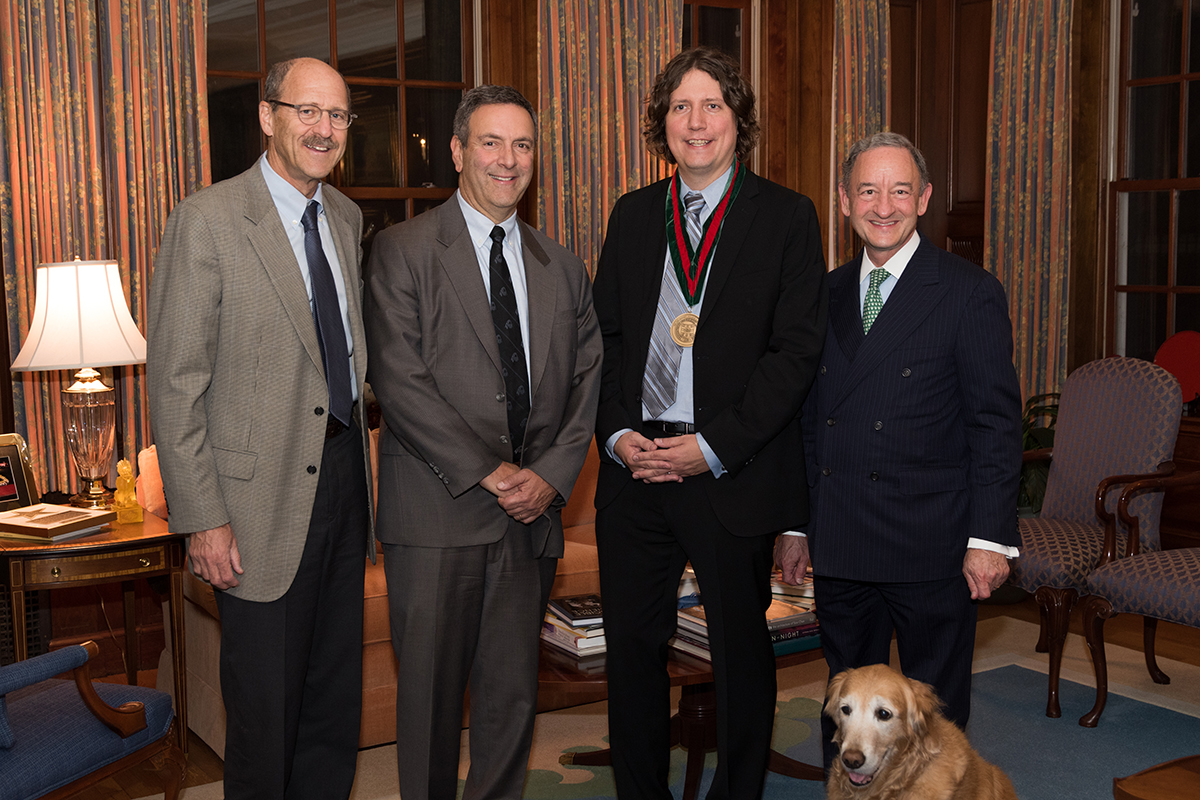Bruchas named Mallinckrodt Professor of Anesthesiology
Studies underpinnings of anxiety, addiction, depression
 Mark Beaven
Mark BeavenMichael R. Bruchas, PhD, delivers a lecture at his installation as the second Henry Elliot Mallinckrodt Professor of Anesthesiology.
Neuroscientist Michael R. Bruchas, PhD, whose research is helping to clarify the neural foundation of behaviors such as anxiety, depression and addiction, has been installed as the Henry Elliot Mallinckrodt Professor of Anesthesiology at Washington University School of Medicine in St. Louis.
This is the second Mallinckrodt professorship in anesthesiology. The first was endowed in the 1940s and is held by Alex S. Evers, MD, head of the Department of Anesthesiology. The new professorship was created when the original fund grew to the point that a second professorship was possible.
Bruchas was installed by Chancellor Mark S. Wrighton and David H. Perlmutter, MD, executive vice chancellor for medical affairs and dean of the School of Medicine.
“We frequently remark that our donors’ generosity will bring benefit for generations, and this new professorship is proof,” Chancellor Mark S. Wrighton said. “It also recognizes the groundbreaking work of Michael Bruchas in increasing our understanding of the neuronal underpinnings of behavior.”
The fund endowing the professorship was created in 1948 by Edward Mallinckrodt Jr. and his wife, Elizabeth Elliot Mallinckrodt, in memory of their son, Henry Elliot, who died in 1945 at age 31.
“We are pleased the work of Michael Bruchas will be supported by this endowment,” Perlmutter said. “His work using optogenetic techniques has the potential to contribute to great progress in the understanding and treatment of pain, stress, addiction and depression.”
Bruchas and his colleagues have focused on dissecting circuits in the brain that are involved in affective behaviors. They attempt to uncover novel drug targets and circuits that may help in the treatment of psychiatric disorders. The Bruchas lab has extensively employed an approach called optogenetics, in which light is used to activate specific brain cells and understand their role in behavior.
He has contributed significantly to the field of optogenetics by developing novel biological and engineering techniques and equipment. The work has helped clarify how brain cells and brain networks in mice behave when the animals are anxious, addicted or engaged in depressive-like behaviors. His work also has led to deepened understanding of the impact of stress on the brain and behavior.
Bruchas is a co-founder of Neurolux, a startup company that is developing wireless, microLED devices that can activate and record the activity of neurons in the brains of mice as they move freely in their environments.
“Michael’s research is elucidating how the brain encodes emotional behaviors,” Evers said. “His work is expanding our knowledge of how neurons act to influence behavior, and it soon may have a clinical impact. Working with Rob Gereau in our anesthesiology department and with an engineering team at the University of Illinois, Michael has developed devices that are helping us understand behavior at the cellular level and that one day may be used to treat people who have chronic pain.”
Bruchas’ laboratory is part of the Washington University Pain Center, a multidisciplinary center established by the anesthesiology and psychiatry departments. His lab has published more than 65 scientific papers and book chapters.
“I am honored and humbled by this recognition,” Bruchas said. “I am involved in a great deal of high-risk, high-reward research, and often the science we want to pursue represents new areas of research that some funding agencies and foundations may be hesitant to support. So it is important to have reliable sources of funding, such as this endowment.”
Bruchas earned his bachelor’s degree in biology and his doctorate in pharmacology from Creighton University. He completed a postdoctoral fellowship in neuroscience at the University of Washington, Seattle, where he examined how the brain encodes emotional behaviors, as well as how stress affects anxiety, depression and addiction.
He joined the School of Medicine faculty in 2010 and also has appointments in neuroscience, psychiatry and biomedical engineering.
Edward Mallinckrodt Jr. was the son of the founder of Mallinckrodt Chemical Works in St. Louis. He succeeded his father as chairman of the board and CEO when Edward Mallinckrodt died in 1928. Mallinckrodt Jr. was a Washington University trustee from 1928 to 1942 and an emeritus trustee from 1950 until his death in 1967. During his life, he made endowments in his father’s name to the School of Medicine’s Departments of Pediatrics, of Pharmacology, and of Pathology and Immunology, and to Mallinckrodt Institute of Radiology. In 1976, the university named the student union and performing arts center after him to honor the family.
 Mark Beaven
Mark Beaven





